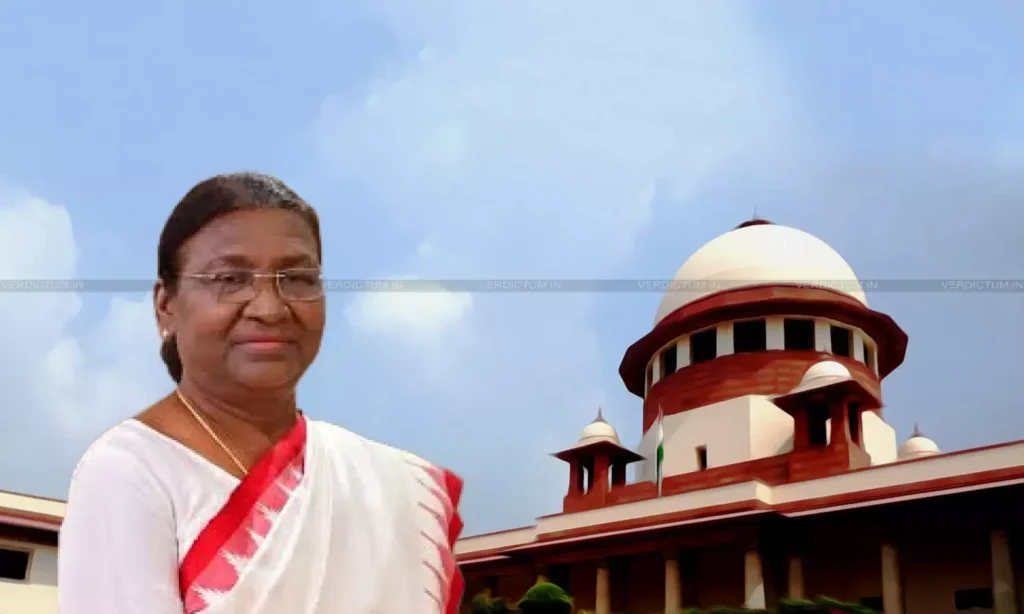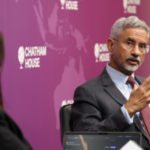By Dr. Gyan Pathak
The Supreme Court Bench comprising of Justice JB Pardiwala and Justice Mahadevan had earlier turned down the request of the Government of India to send the case relating to assent to bills by governors and president to a larger Constitution Bench on the ground that it involved ‘substantial questions of law’. Nevertheless, the Bench went ahead and announced its final verdict imposing deadline on governors and president on assent on bills.
It had determined that the case did not raise any ‘substantial question of law’ requiring for a Constitution Bench hearing. The Bench deemed the issues involved were more about the interpretation and application of existing legal principles rather than a fundamental challenge to the Constitution itself.
After refusal of the Supreme Court Bench to send the case to a larger Constitution Bench, the government had no option left to explore the presidential reference route to send the case to a Constitution Bench for review.
Now the President of India, by exercising the provision of the Constitution of India under article 143(1) allowing the President to seek the Supreme Court’s opinion on the matter of legal and public importance, has made a reference to the Supreme Court of India for its opinion on the judgement, that imposed time limit for assent on bills passed by states by the governors and the president. The top court will now have to set up a Constitution Bench for answering the reference.
In the landmark judgement on April 8, 2025, in the State of Tamil Nadu vs Governor of Tamil Nadu case, the Bench had set the timeline for the President to act as per Article 201 of the Constitution of India on Bills which the Governor has sent for the President’s assent. The court held that the President must take a decision within 3 months on the Bills reserved. The Bench has also set a timeline for the Governor’s action on Bills under Article 200.
The Bench has said that in case of any delay beyond this period, appropriated reasons would have to be recorded and conveyed to the concerned state.
The Bench had referred to the recommendation made by the Sarkaria and Punchhi Commissions. It also referred the office memorandum issued by the Ministry of Home Affairs, Government of India dated February 4, 2016 which said, “A time limit of maximum 3 months be strictly adhered to for finalizing the Bills after their receipt from the State Government”. The court thus borrowed from the guidelines issued by the Central Government itself as regards the time limits for decisions under Article 201 of the Constitution of India.
The Bench held that like the Governor, even the President can also not exercise “absolute veto’ by indefinitely sitting over the Bills. The bench also held that there would be a deemed consent in case of failure to abide by the timeline set for granting assent to the bills.
In her reference, President Draupadi Murmu posed 14 questions. Questions are important, but whether those are ‘substantial questions of law’ or not is to be decided by the Supreme Court of India, apart from answering the questions.
These questions are:
- What are the constitutional options before a Governor when a Bill is presented to him under Article 200 of the Constitution of India?
- Is the Governor bound by the aid & advice tendered by the Council of Ministers while exercising all the options available with him when a Bill is presented before him under Article 200 of the Constitution of India?
- Is the exercise of constitutional discretion by the Governor under Article 200 of the Constitution of India justiciable?
- Is Article 361 of the Constitution of India an absolute bar to the judicial review in relation to the actions of a Governor under Article 200 of the Constitution of India?
- In the absence of a constitutionally prescribed time limit, and the manner of exercise of powers by the Governor, can timelines be imposed and the manner of exercise be prescribed through judicial orders for the exercise of all powers under Article 200 of the Constitution of India by the Governor?
- Is the exercise of constitutional discretion by the President under Article 201 of the Constitution of India justiciable?
- In the absence of a constitutionally prescribed timeline and the manner of exercise of powers by the President, can timelines be imposed and the manner of exercise be prescribed through judicial orders for the exercise of discretion by the President under Article 201 of the Constitution of India?
- In light of the constitutional scheme governing the powers of the President, is the President required to seek advice of the Supreme Court by way of a reference under Article 143 of the Constitution of India and take the opinion of the Supreme Court when the Governor reserves a Bill for the President’s assent or otherwise?
- Are the decisions of the Governor and the President under Article 200 and Article 201 of the Constitution of India, respectively, justiciable at a stage anterior into the law coming into force? Is it permissible for the Courts to undertake judicial adjudication over the contents of a Bill, in any manner, before it becomes law?
- Can the exercise of constitutional powers and the orders of/by the President / Governor be substituted in any manner under Article 142 of the Constitution of India?
- Is a law made by the State legislature a law in force without the assent of the Governor granted under Article 200 of the Constitution of India?
- In view of the proviso to Article 145(3) of the Constitution of India, is it not mandatory for any bench of this Hon’ble Court to first decide as to whether the question involved in the proceedings before it is of such a nature which involves substantial questions of law as to the interpretation of constitution and to refer it to a bench of minimum five Judges?
- Do the powers of the Supreme Court under Article 142 of the Constitution of India limited to matters of procedural law or Article 142 of the Constitution of India extends to issuing directions /passing orders which are contrary to or inconsistent with existing substantive or procedural provisions of the Constitution or law in force?
- Does the Constitution bar any other jurisdiction of the Supreme Court to resolve disputes between the Union Government and the State Governments except by way of a suit under Article 131 of the Constitution of India?
The issues for consideration before the Bench imposing deadline for assent on bills were:
- What courses of action are available to the Governor in exercise of his powers under Article 200 of the Constitution?
- Whether the Governor can reserve a bill for the consideration of the President at the time when it is presented to him for assent after being reconsidered in accordance with the first proviso to Article200, more particularly, when he had not reserved it for the consideration of the President in the first instance and had declared withholding of assent thereto?
- Whether there is an express constitutionally prescribed time-limit within which the Governor is required to act in the exercise of his powers under Article 200 of the Constitution?
- Whether the Governor in the exercise of his powers under Article200 of the Constitution can only act in accordance with the aid and advice tendered to him by the State Council of Ministers? If not, whether the constitutional scheme has vested the Governor with some discretion in discharge of his functions under Article 200?
- Whether the exercise of discretion by the Governor in discharge of his functions under Article 200 could be said to be subject to judicial review? If yes, what are the parameters for such judicial review?
6. What is the manner in which the President under Article 201 of the Constitution is required to act once a bill has been reserved for his consideration by the Governor under Article 200 of the Constitution? (IPA Service)

 Indian Ministers Are Only Helping Internationalisation Of Kashmir Issue Through Loose Remarks
Indian Ministers Are Only Helping Internationalisation Of Kashmir Issue Through Loose Remarks 